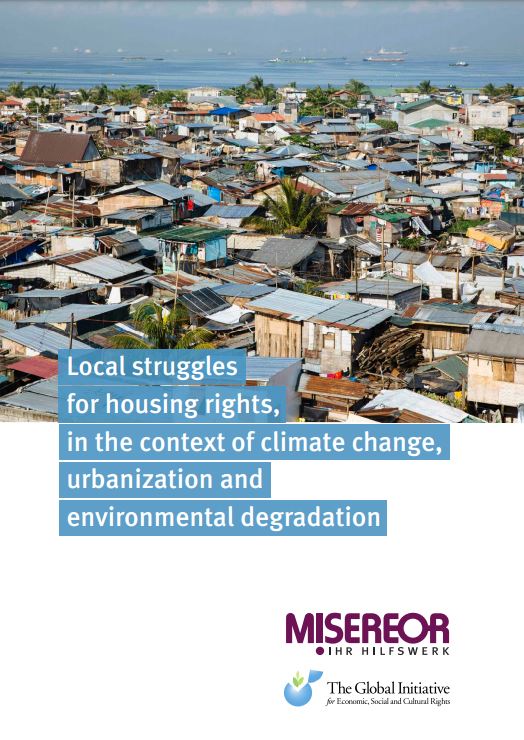A joint initiative of the Global Initiative for Economic, Social and Cultural Rights and MISEREOR, and six civil society organizations some Members of HIC, who are working on the right to housing and related issues at the national and local levels
Across the world, the right to adequate housing is under pressure from climate change, urbanization and environmental degradation. The urban population is growing, in part because more and more people are moving to the cities, including as a consequence of climaterelated push factors.
Informal settlement dwellers and people living in poverty are particularly vulnerable to the increasing impacts of the climate crisis such as natural disasters, increasingly severe storms and sea level rise. Often poor communities are forced to settle on precarious land at the coast, on the banks of rivers or hillsides, or land that is subject to flooding. This increases their vulnerability to climate-induced disasters such as mudslides, flooding, extreme storms and sea level rise.
Although they are the most affected, more often than not poor communities and informal settlement dwellers, do not receive any support to protect themselves from climate change impacts and other crises, such as the COVID-19 pandemic, or to address environmental degradation. This neglect is often a consequence of not being recognized as rights-holders by society or the state. Further, climate change and disaster risk reduction
are increasingly being used as excuses for demolitions and evictions of informal settlements to make way for modernization and development projects, without adequate resettlement programs for displaced persons.
Adequate housing with access to water, sanitation and other necessary infrastructure and services, is a crucial element of crisis resilience, both in response to climate-induced disasters and to pandemics. States must urgently put in place measures to ensure those rights are respected, protected and fulfilled, including for the most disadvantaged in society. Participation of those affected is key. Therefore, States must start by engaging directly with poor communities to understand their needs and work with them to design sustainable solutions.
This publication is a joint initiative of the Global Initiative for Economic, Social and Cultural Rights, MISEREOR, and six civil society organizations some Members of HIC, who are working on the right to housing and related issues at the national and local levels:
– Fundacio n Salvadoreña de Desarrollo y Vivienda Mi nima (FUNDASAL), El Salvador
– Association pour l’Amour du Livre et le Développement Local (ASSOAL), Cameroon
– Pagtambayayong, the Philippines
– Community Organizers Multiversity (COM), the Philippines
– Centro de Investigación, Documentación y Asesoría Poblacional (CIDAP), Peru
– Spaces for Change, Nigeria.
It aims to show how the right to adequate housing and related rights (e.g.: water and sanitation) are threatened by climate change, increasing urbanization and environmental degradation, by highlighting ground-level experiences from Africa, Asia and Latin America. It aims to encourage an integrated approach to policy-making and to present examples of community-led advocacy and solutions from civil society groups from five countries:
Cameroon, El Salvador, Nigeria, Peru and the Philippines. The report concludes with recommendations to national governments, local governments and the UN human rights mechanisms.
The publication resultes were presented during the online event “Local struggles for housing rights in the context of climate change, urbanization and environmental degradation: How do we create “resilient” communities in the face of multiple crises, including COVID-19?” that took place on 5th of October, World Habitat Day. We are very pleased to share the following information with you:
- If you would like to watch the event again or share it with your colleagues, allies and contacts, you can find here the recording of the session (in original language of the speaker’s).
- The summaries of the report are available in English, German, French and Spanish and published it online.
- Further, the case studies of El Salvador and Perú are available in Spanish. The case study Cameroun is available in French.
- You can access the full English Report here.

